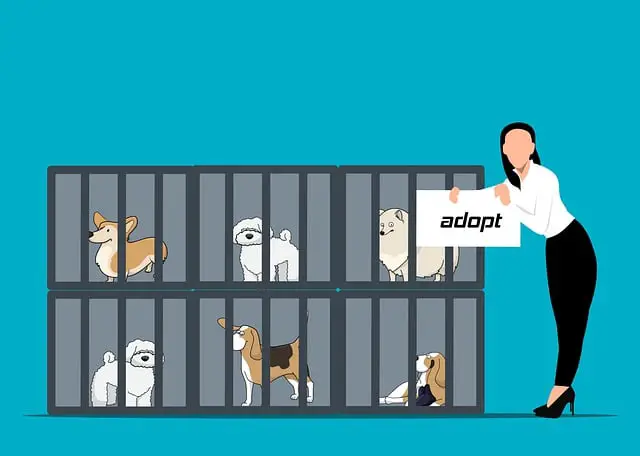When it comes to dogs, there is a wide variety of breeds to choose from, each with their own unique characteristics and traits. Two breeds that stand on opposite ends of the spectrum are the Border Collie and the Chihuahua.
- The Border Collie is a medium to large-sized dog known for its intelligence, herding abilities, and high energy levels.
- In contrast, the Chihuahua is a tiny dog with a big personality, known for its loyalty, sass, and affectionate nature.
While both breeds make great companions, they differ greatly in size, temperament, and energy level, making them suitable for different types of owners and living environments. In this article, we will explore the differences between these two breeds in greater detail.
Characteristics Comparison between Chihuahua and Border Collies
Both the Border Collie and the Chihuahua have their own distinctive characteristics that set them apart from each other. While Border Collies are larger dogs with a more active lifestyle, Chihuahuas are smaller in size and require less physical exercise.
Border Collies have strong herding instincts and are highly trainable, while Chihuahuas are more self-assured and make excellent watchdogs. Both breeds make great companions for those who appreciate their unique qualities, and it’s important to consider your own lifestyle and living situation when choosing a dog breed.
Whether you prefer a high-energy herding dog or a sassy little watchdog, the Border Collie and the Chihuahua can bring joy and companionship to their owners.
| Characteristics | Border Collie | Chihuahua |
| Weight | Male: 30–45 lbs.
Female: 30–42 lbs. |
Male: 2-6 lbs.
Female: 2-6 lbs. |
| Height | Male: 22 in.
Female: 20 in. |
Male: 9 in.
Female: 7 in. |
| Coat colors |
Red and white, black with or without white, solid color, bi-color, tri-color, merle, sable. |
Various |
| Lifespan | 10–14 yrs. | 14-18 yrs. |
| AKC Classification | Toy | Herding |
Border Collies are renowned for their high level of intelligence and trainability, coupled with their natural herding instincts and protective nature towards their family. To keep them happy and healthy, they require regular exercise and mental stimulation due to their abundant energy levels.
In contrast, Chihuahuas may be small in size, but they make up for it with their big personality. These dogs are known for their self-assurance and boldness, which makes them excellent watchdogs and loyal companions. Despite their small stature, they are lively and love to play, displaying a remarkable sense of bravery that belies their diminutive size.
Breed History
Border Collies have a fascinating history as working dogs bred specifically for their exceptional herding abilities. The breed originated in the border region between Scotland and England, where they were developed to assist farmers and shepherds in managing their livestock.
Border Collies have a long history of working with sheep and other livestock in the United Kingdom, and their intelligence, athleticism, and loyalty have made them popular with farmers and ranchers all over the world. In fact, they are widely regarded as the premier sheepherding dogs globally, with their working abilities being prized over their physical appearance.
The Chihuahua is a breed with a rich history that spans over centuries. It is believed that the Techichi, a small and silent dog kept by the Toltec people, is the direct ancestor of the modern-day Chihuahua. The breed was also highly valued by the Aztecs, who believed that it had supernatural powers that could guide the soul of a deceased person to the underworld.
When Spanish conquistadors arrived in Mexico in the 16th century, they were impressed by the Chihuahua’s small size and affectionate nature, and they began to bring them back to Europe. However, it was not until the mid-19th century that the breed gained recognition in the United States, and it quickly became a popular pet among the wealthy elite.
The Chihuahua’s popularity continued to grow throughout the 20th century, and the breed was officially recognized by the American Kennel Club in 1904. Today, Chihuahuas are one of the most popular dog breeds in the world and are beloved for their loyal and affectionate nature, as well as their charming and lively personalities.
Appearance of Border Collie vs Chihuahua

Border Collies are medium-sized dogs with an athletic and well-balanced build. They have a graceful, agile, and strong physique that is slightly longer than their height. One of the breed’s most distinctive features is their oval-shaped eyes, which come in shades of brown or light blue. Their sharp vision is essential in their herding work, and they are known for their intense gaze, which seems to control the flock.
Chihuahuas have a unique appearance, with a small size, pointed ears, and expressive eyes that capture the hearts of their owners. Despite their small size, they have a big personality. Their body is off-square, meaning they are slightly longer than they are tall, and this adds to their distinctive look.
Dog Size Comparison
Border Collies are medium-sized dogs, standing at an average height of 18 to 22 inches (46 to 56 cm) at the shoulder and weighing between 27 to 55 pounds (12 to 25 kg), with males usually larger than females. They have a well-balanced and athletic appearance, with a slightly longer body than they are tall and an overall graceful and agile physique.
In contrast, Chihuahuas are a toy breed, weighing between 2 and 6 pounds (0.9 to 2.7 kg) and standing between 6 to 9 inches (15 to 23 cm) tall at the shoulder. Some Chihuahuas may grow up to 30 to 38 cm (12 to 15 in) in height, but this is rare. Their overall body length is usually between 9.5 to 15 inches (24 to 38 cm), and their standing height ranges from 8.5 to 13 inches (22 to 33 cm).
Coats & Colors
Border Collies are known for their extensive range of colors and markings, which can include solid colors, bi-color, tri-color, merle, and sable. The most common coat color among Border Collies is black and white, but they can also come in shades of red, blue, and lilac.
For those who prefer a tricolored Border Collie, it is worth noting that this is the second most prevalent coat type, typically consisting of black, white, and tan. Even when mostly white, Border Collies typically display some coloring.
The American Kennel Club recognizes several colors, including black and white, blue and white, red and white, sable and white, and solid black.
Chihuahuas are known for their wide range of coat colors and patterns, which includes black, brown, cream, red, silver, fawn, chocolate, and white. These can be combined with a variety of markings, ranging from solid to spotted, and color combinations such as black and tan, blue and tan, and chocolate and tan. While solid black is a relatively uncommon color, it can sometimes be mixed with brown. In terms of coat types, Chihuahuas have two primary variations: smooth and long.
- Smooth coats are sleek and close-fitting, with a ruff of thick, longer hair at the neck.
- Long-coated dogs have soft fur that can be either flat or slightly curly. They often have a fringe of hair around their ears and a plumed tail, which adds to their elegant appearance.
Personality & Temperament of Border Collie vs Chihuahua

Border Collies are renowned for their intelligence, high energy levels, and stable temperament, making them wonderful pets for those who can keep up with their enthusiasm. They are incredibly loyal and protective of their family members, which is a testament to their devoted nature.
As working dogs, Border Collies thrive when given tasks to do, especially if they can work alongside their owners. However, their strong loyalty can result in aggressiveness towards strangers or other dogs if not socialized correctly.
Border Collies are highly trainable and responsive to positive reinforcement. They enjoy sprinting across open spaces and require plenty of exercise to remain content. When properly socialized, they get along well with children and other pets, making them a perfect addition to families.
Chihuahuas are famously loyal and affectionate towards their owners, often forming strong bonds with a single person and becoming fiercely protective of them. With their alert nature and wariness of strangers, they make excellent watchdogs. When properly socialized, they can be sociable and loving towards their family members. To prevent Chihuahuas from becoming too dominant, it is essential to establish ground rules and stick to them.
Despite their size and origin differences, both Border Collies and Chihuahuas share similar characteristics such as loyalty and protectiveness towards their owners. Both breeds are highly trainable, but also require plenty of exercise and mental stimulation to stay happy.
It is essential to socialize both breeds correctly to prevent any potential aggression towards strangers or other dogs. Establishing rules and boundaries with both breeds can prevent them from becoming too dominant.
Family Interactions
Border Collies can make excellent family dogs if they receive proper training and socialization. They are loyal and protective of their families, but may develop negative behaviors like excessive barking and chewing without a job or task to do. Providing them with plenty of exercise and mental stimulation is crucial to their happiness and well-being.
On the other hand, Chihuahuas can form a strong bond with one person in a family and can be an ideal pet for single-person households or families where one person will be the primary caregiver for the dog. When raised and socialized correctly, Chihuahuas can be loving, excitable, and sociable with their loved ones.
Attitude towards Kids
If Border Collies are given proper training, socialization, and enough exercise, they can be wonderful companions for children. They have a high level of energy and enthusiasm, which makes them ideal for families with school-aged kids.
While Border Collies are not inherently aggressive, they may bite out of fear or annoyance if children continuously pester them. Therefore, it’s important to educate children on how to treat their furry friends with kindness and respect.
Border Collies have a strong herding instinct and tend to be lively and energetic. As a result, they may present a challenge for younger children. However, by teaching kids to respect their personal boundaries and not harass them, Border Collies can coexist peacefully with other family members and dogs.
When it comes to Chihuahuas and children, proper training, socialization, and supervision are key. While Chihuahuas have the potential to be good with children, they can become jealous of a child’s attention and may withdraw, making them less suitable for younger kids. Therefore, it’s important to teach children to respect their boundaries and not harass them.
However, Chihuahuas can make great pets for families with older children if they are given enough training, socialization, and supervision. By providing these little dogs with the proper care and attention, they can become fantastic companions for the whole family.
Simply put, Border Collies can be great pets for families with older children if they are trained, socialized, and exercised properly. They may bite if children continuously bother them, so it’s important to teach children to treat them kindly and respectfully. Chihuahuas have the potential to be good with children, but they can become jealous and withdrawn. They require training, socialization, and supervision, and can make great pets for families with older children if they receive proper care and attention.
Other People
Border Collies are generally not aggressive towards strangers but may exhibit reserved behavior around them. They may naturally be wary of unfamiliar people, and during their adolescence, they can become fearful of strangers.
If young Border Collies display unfriendly behavior towards strangers, it may be due to nervousness. It is essential to socialize them properly and provide them with positive experiences around new people.
Chihuahuas are known to be wary of strangers and may be prone to fear biting. They can also display aggressive behavior towards other people, especially if they are protective of their owners. There are various reasons why a Chihuahua may exhibit aggressive behavior towards strangers or their owners, such as lack of socialization or past negative experiences.
It’s important to understand the behavior and temperament of Chihuahuas and provide them with the necessary training and socialization to prevent aggressive behavior towards others.
Dogs & Other Animals
When it comes to Border Collies getting along with other dogs, proper training, socialization, and exercise are key. These dogs are protective and tend to use herding tactics like barking, nipping, and the ‘eye,’ which might not be suitable for other pets.
It’s important to socialize Border Collies with other dogs early on to help them see them as companions rather than a threat to their flock. With the right training and consistency, Border Collies can get along well with other dogs and make great companions.
With proper training, socialization, and supervision, Chihuahuas can get along well with other dogs. However, these tiny dogs can be feisty and may snap if they feel stressed or threatened. When introducing a Chihuahua to other dogs, it’s important to do so slowly and carefully, and never leave them unsupervised during the introduction.
When it comes to getting along with other dogs, both Border Collies and Chihuahuas can do so if they are properly trained, socialized, and supervised. While Border Collies are known for their protective herding tactics, which may not be suitable for other pets, they can be socialized with other dogs at an early age. Chihuahuas, on the other hand, can be feisty and defensive, but they can also coexist peacefully with other dogs if they are carefully introduced and supervised. It’s important to introduce both breeds to other dogs slowly and with caution, and to never leave them unsupervised during the introduction.
Behaviour Issues

Like any other breed of dog, Border Collies can experience behavioral issues. These may include obsessive activity patterns, anxieties, phobias, or aggression problems. One of the most common types of aggression in Border Collies is feeling threatened, which they tend to show towards unfamiliar people. As such, owners of Border Collies should be aware of these potential issues and take appropriate measures to manage them.
Chihuahuas may exhibit various behavior problems, such as begging, housetraining challenges, separation anxiety, and fear biting. These tiny dogs can be wary of strangers and are more prone to fear biting, so it’s crucial to understand their behavior and approach them properly. As such, owners of Chihuahuas should be aware of these common issues and take necessary steps to address them.
It’s crucial to prevent behavioral issues in dogs not only for their well-being but also for the safety of those around them. One effective way to achieve prevention is by identifying and avoiding situations that may expose the dog to negative stimuli. Additionally, teaching basic cues and using positive reinforcement can help prevent impulse control issues as they grow older. By taking a proactive approach to prevent behavioral issues in dogs, owners can promote a safer and happier living environment for everyone involved.
To effectively manage aggression, it’s essential to identify the root cause of the behavior, set clear boundaries, and provide ample exercise and mental stimulation.
Comparing Training & Exercise between Chihuahua and Border Collies
Before starting Border Collie training, it’s essential to research the breed and understand their personality. Consistency and firmness are crucial in maintaining their attention during training sessions. It’s also important to provide plenty of exercise and mental stimulation since Border Collies are high-energy dogs.
Incorporating training into playtime activities like playing fetch can make it more enjoyable for both the dog and the owner. Some essential Border Collie training steps include basic obedience, socialization, leash training, and house training.
Long walks, running, hiking, playing fetch, and agility training are ideal exercises for this breed. According to top veterinarians and experts, Border Collies require approximately 1 to 2 hours of exercise each day to release their pent-up energy. Additionally, since Border Collies enjoy being active and completing tasks, providing them with simple tasks or jobs can help keep them mentally and physically stimulated. By incorporating regular exercise and activities into their daily routine, owners can help their Border Collies stay healthy and happy.
Training Chihuahuas can be a rewarding experience with the right approach. It is crucial to start training them from a young age and use positive reinforcement techniques to encourage good behavior. Basic training commands like potty, crate, and recall training are important. However, it’s essential to be patient and consistent with Chihuahuas as they can be challenging to train.
Owners should avoid training when they are tired or angry and consider using the conditioning method to help Chihuahuas socialize with other dogs.
Regular exercise is crucial for Chihuahuas to maintain their physical and mental health. They require about 30-40 minutes of exercise each day, which can be achieved through walks, playtime, or other simple exercises. Chihuahuas can handle shorter but more frequent walks instead of one long walk.
Taking Care & Maintenance of Border Collie vs Chihuahua
Border Collies are high-energy dogs that require proper care and maintenance to stay healthy and happy. It is important to monitor their weight, provide them with a balanced and nutritious diet, and seek veterinary advice if any health issues arise.
Chihuahuas need regular grooming in addition to a balanced diet and regular exercise to maintain the health of their coat and skin. This includes regular brushing to remove tangles and keep their fur in good condition. It’s also important to trim their nails and clean their teeth as part of their grooming routine. These dogs are prone to dental issues, so regular teeth cleaning helps prevent tooth decay and gum disease, promoting their overall oral health.
It is also important to monitor their health and watch for any signs of illness or discomfort, as Chihuahuas can be prone to certain health issues such as luxating patella, dental problems, and collapsing trachea. Regular visits to the veterinarian can help catch and address any health issues early on.
Grooming
If you have a Border Collie, you’ll want to keep their double coat healthy and shiny. To do that, you’ll need to groom them every 1 to 2 months, and more often during shedding season. Grooming can take time, so you’ll need to be patient and consistent. Brushing their coat about three times a week is essential to prevent tangles and mats.
Take your time when grooming your Border Collie and use gentle techniques. If your Border Collie has long hair, they will need more grooming than those with short hair. You can use a slicker brush and comb to remove tangles and mats from their coat. When bathing them, make sure to use a dog-specific shampoo and conditioner to avoid skin irritation.
To keep your Chihuahua’s coat healthy and shiny, it’s important to use the proper techniques and tools when grooming them. For most Chihuahuas, nail trimming should be done every three months to avoid overgrown nails.
If your Chihuahua has long hair, it’s recommended to use a slicker or pin brush to remove tangles and mats, particularly in areas with longer hair. On the other hand, for short-haired Chihuahuas, a rubber brush or grooming mitt can help remove loose hair and dirt from their coat.
To prevent tangles and mats, it’s best to start slowly and brush them regularly. When your Chihuahua is dirty or smelly, give them a bath using a dog-specific shampoo and conditioner to prevent skin irritation. Lastly, it’s important to make grooming a positive experience by praising them throughout the process.
Finding a professional dog groomer requires careful research and consideration to ensure that your furry friend receives safe and successful grooming services. To start with, look for a groomer who has experience in grooming the breed of dog you own. Additionally, make sure that the groomer’s facilities are clean, tidy, and professional, and that you feel comfortable leaving your pet there.
It’s important to check for licensing and certification to confirm that the groomer has proper training and credentials. You can also read reviews and ask for recommendations from friends, family, or your veterinarian to help you find a reputable and trustworthy groomer. By taking these steps, you can feel confident that you have chosen a groomer who will provide the best care for your furry companion.
Shedding
The amount of shedding will vary depending on whether you have a smooth or rough coat Border Collie. Border Collies shed to remove old and damaged hair and to regulate their body temperature. This shedding is a natural process that helps to keep their coat healthy and well-maintained.
Chihuahuas are moderate shedders, even short-haired ones. They shed throughout the year, but spring and fall are the seasons when they shed the most, with spring being the heaviest shedding season. While some Chihuahuas have single coats, others have double coats, which means they shed like other dogs. Shedding is a natural process that helps to keep their coat healthy and free of dead or damaged hair. Regular brushing and grooming can help to control shedding and keep your Chihuahua’s coat healthy and shiny.
Health Comparison between Border Collie and Chihuahua
Border Collies are a generally robust and healthy breed, but like many dogs, they may be predisposed to certain health issues such as hip dysplasia, epilepsy, and Collie Eye Anomaly due to their genetic makeup. It is important to purchase a Border Collie from a responsible breeder who screens their breeding stock for these conditions to minimize the risk of passing them on to the puppies.
Chihuahuas, like all dogs, have a predisposition to certain medical conditions such as heart problems, eye disease, patellar luxation, and hydrocephalus. Additionally, Chihuahuas are prone to obesity, which can increase the risk of other health issues.
To keep your Chihuahua healthy and happy, it’s essential to provide them with a well-balanced diet and daily exercise. If your adult Chihuahua is gaining weight, you may need to provide them with a restricted-calorie diet to help maintain a healthy weight. With proper care and attention, Chihuahuas can live long and healthy lives, providing joy and companionship to their families.
Both Border Collies and Chihuahuas are predisposed to certain health issues, such as eye disease and hip dysplasia. Additionally, Chihuahuas are prone to obesity, while Border Collies require plenty of mental stimulation and exercise to prevent destructive behavior. Proper care and attention are crucial for both breeds to ensure they live long and healthy lives. Responsible breeders will screen breeding stock for potential health issues to reduce the risk of passing them onto offspring.
Life Span
On average, Border Collies have a lifespan of 12 to 15 years, while Chihuahuas are known for their longevity, typically living 14 to 16 years. Although there are claims of Chihuahuas reaching the ages of 20, 21, or even 22 years, these reports lack substantiation.
It’s important to consider that a dog’s lifespan can be influenced by various elements, such as:
- Genetics
- Diet
- Exercise
- Overall health
Therefore, providing proper care, including regular veterinary check-ups, a balanced diet, exercise, and a loving environment, is crucial to ensure your cherished companion enjoys a long and fulfilling life.
Diet & Nutrition
A Border Collie’s diet should ideally include high-quality protein from meat sources, essential fatty acids, and omegas, a small amount of carbohydrates from vegetables, herbs, and berries, natural vitamins and minerals from bone and plant sources, and hydration from high-moisture foods and drinking water. Foods with a high-fat content are recommended for Border Collies, and fruits and vegetables are a great source of nutrients.
In addition to complete dried foods, it is also good to add fresh or cooked meats, raw or cooked vegetables, and supplementary treats to vary their diet.
When selecting commercial dog food, it is important to ensure that the first ingredient is a meat protein. To ensure proper nutrition for a Border Collie, their diet should contain 18-30% protein, 15% carbohydrates, 5-20% fat, and 4% fiber. Homemade food is also a good option because it allows you to modify the nutritional content according to your dog’s needs.
To ensure optimal health, it is crucial to provide Chihuahuas with a balanced diet that meets their unique nutritional requirements. This includes high-quality protein and grains, as well as fresh fruits and vegetables like sweet potatoes, carrots, blueberries, and spinach. It is essential to provide them with clean, fresh drinking water at all times. Avoiding overfeeding and excessive snacking is important to prevent obesity and other health problems.
A balanced diet is crucial for maintaining good health in Chihuahuas and preventing certain health issues. Choosing high-quality dog food that contains all essential nutrients such as protein, carbohydrates, fats, vitamins, and minerals is important. It’s equally important to avoid feeding them human food that can be harmful to their health. Consulting a veterinarian can provide guidance in selecting the best food that meets a Chihuahua’s specific dietary requirements and needs.
Both Border Collies and Chihuahuas require a balanced and high-quality diet to maintain good health. Border Collies need protein, essential fatty acids, and carbohydrates from vegetables and berries, while Chihuahuas benefit from grains and traditional meats while avoiding junk food and certain human foods. Overfeeding should be avoided to prevent obesity, and consulting a veterinarian for a proper diet plan is recommended for both breeds.
Health Issues
Border Collies are generally a healthy breed, but they can still face some health issues. Some of the most common health issues seen in Border Collies include hip dysplasia, and epilepsy. But what actually are these health issues – let’s find out.
- Hip dysplasia – this is a condition that occurs when the hip joint develops abnormally, causing pain, stiffness, and difficulty in movement in dogs. The condition can be influenced by a combination of genetic and environmental factors, such as rapid growth, excessive exercise, and poor nutrition. X-rays and other imaging tests are usually used for diagnosis, and treatment options may include medication, physical therapy, weight management, and surgery in severe cases.
- Epilepsy – seizures associated with idiopathic epilepsy in Border Collies can occur without warning and vary in intensity. While there is no known cure for epilepsy, there are various medications available that can help manage the condition and reduce the frequency and severity of seizures. It is important for Border Collie owners to collaborate closely with their veterinarian to establish the most appropriate treatment plan for their pet’s specific needs.
Chihuahuas are prone to several health issues, some of which are inherited, while others can be prevented through proper nutrition and exercise. Common health issues seen in Chihuahuas include portosystemic shunt (PSS), Legg-Calve-Perthes disease, patellar luxation, and patent ductus arteriosus (PDA). Additionally, Chihuahuas are at risk for heart problems such as mitral valve disease and PDA.
- Portosystemic Shunt – PSS is a liver disease that affects Chihuahuas when an abnormal blood vessel bypasses the liver, preventing it from filtering toxins from the bloodstream. This can lead to various symptoms, such as weight loss, vomiting, seizures, and others mentioned earlier. Diagnosis of PSS typically involves blood tests, ultrasound, or other imaging techniques. Treatment options depend on the severity of the case and may include surgery or medication.
- Legg-Calve-Perthes disease – this is a condition that occurs due to the degeneration of the femoral head, the round top of the thigh bone that connects to the hip socket. This can lead to a reduction in blood supply to the femoral head, causing it to die and collapse. While the exact cause of this degeneration is not fully understood, it is believed to have a genetic component. Dogs affected by the disease may experience symptoms such as pain, limping, and muscle atrophy. Treatment options may include surgery and physical therapy.
- Patent Ductus Arteriosus – PDA is a heart defect. Diagnosis of PDA usually involves a physical examination, radiography, and echocardiography. Treatment options for PDA include medical management or surgical correction.
Cost of Chihuahua vs Border Collie
Owning a dog can quickly become expensive, and potential owners should carefully consider all expenses before committing to ownership. The cost of owning a dog can vary widely depending on factors such as breed, age, and individual needs.
For example, some breeds may require more expensive food or grooming, and older dogs may require more frequent visits to the veterinarian. Pet insurance can help offset the costs of unexpected veterinary care, but it’s important to research different policies and coverage options to find the best fit for the individual dog and owner.
Puppies
According to estimates, the annual cost of owning a Border Collie can range from $1,000 to $1,800, and unexpected veterinary expenses can increase this cost. Therefore, it is crucial to consider the financial obligations of owning a dog before making a commitment. Other expenses such as food, grooming, training, veterinary care, and supplies should also be considered while calculating the total cost of ownership.
Chihuahua puppies from reputable breeders typically range in price from $1,000 to $3,500. The actual cost can vary based on factors such as the
- Type
- Breeder’s reputation
- Bloodline
- Age
- Location
On average, Chihuahua puppies in the United States are priced around $1,300, with approximately 80% falling within the $500 to $2,500 range. It’s important to consider these factors when budgeting for a Chihuahua puppy and ensure that you purchase from a reputable source.
Breeders & Centers

There are many reasons to consider adopting a dog from a shelter. Adopting a dog from a shelter provides an opportunity to offer a second chance to an animal that may have been abandoned due to a variety of reasons such as lack of pet-friendly housing or inability to provide veterinary care.
Additionally, adopting a dog from a shelter can help save a life and create space for another animal in need to find a loving home. This can have a positive impact on animal welfare by reducing the number of animals that are euthanized each year.
Likewise when looking for a responsible dog breeder, there are several signs to look for.
- Reputable breeders prioritize the health of their dogs by conducting health screenings to identify genetic issues that could potentially be passed down to their puppies.
- They breed only dogs that meet the breed standard and have no known health issues.
- They care for their dogs as if they are part of the family, aiming to bring healthy, well-adjusted dogs into the world and ensuring they find loving homes.
- Ultimately, their goal is to produce healthy dogs that are physically and behaviorally stable and meet the breed standard.
Conclusion: Which Is Better, Chihuahua or Border Collie?
It is impossible to definitively state which breed is better between Chihuahuas and Border Collies, as both breeds have unique characteristics and qualities that make them suitable for different types of owners and lifestyles.
Border Collies are renowned for their exceptional intelligence and boundless energy, which makes them ideal companions for individuals with an active lifestyle. They have a natural instinct to protect and are devoted and affectionate towards their families. Border Collies also excel in tasks that require mental stimulation and physical activity. With their vigilant nature, they serve as protective members of the family. Their loyalty and drive make them excellent working dogs and perfect companions.
On the other hand, Chihuahuas are small dogs that are easy to care for and make great companions for those who want a lap dog. They are affectionate and loyal, and their small size makes them ideal for living in apartments or small homes. However, they can be prone to health issues and may not be as well-suited for families with young children.
Ultimately, the decision between a Chihuahua or Border Collie should be based on the lifestyle and needs of the individual owner. Both breeds have their unique strengths and weaknesses, and it is essential to carefully consider these factors before making a decision. The best dog for you is the one that fits your lifestyle and personality best, and with proper care and training, any dog can make an excellent companion.


